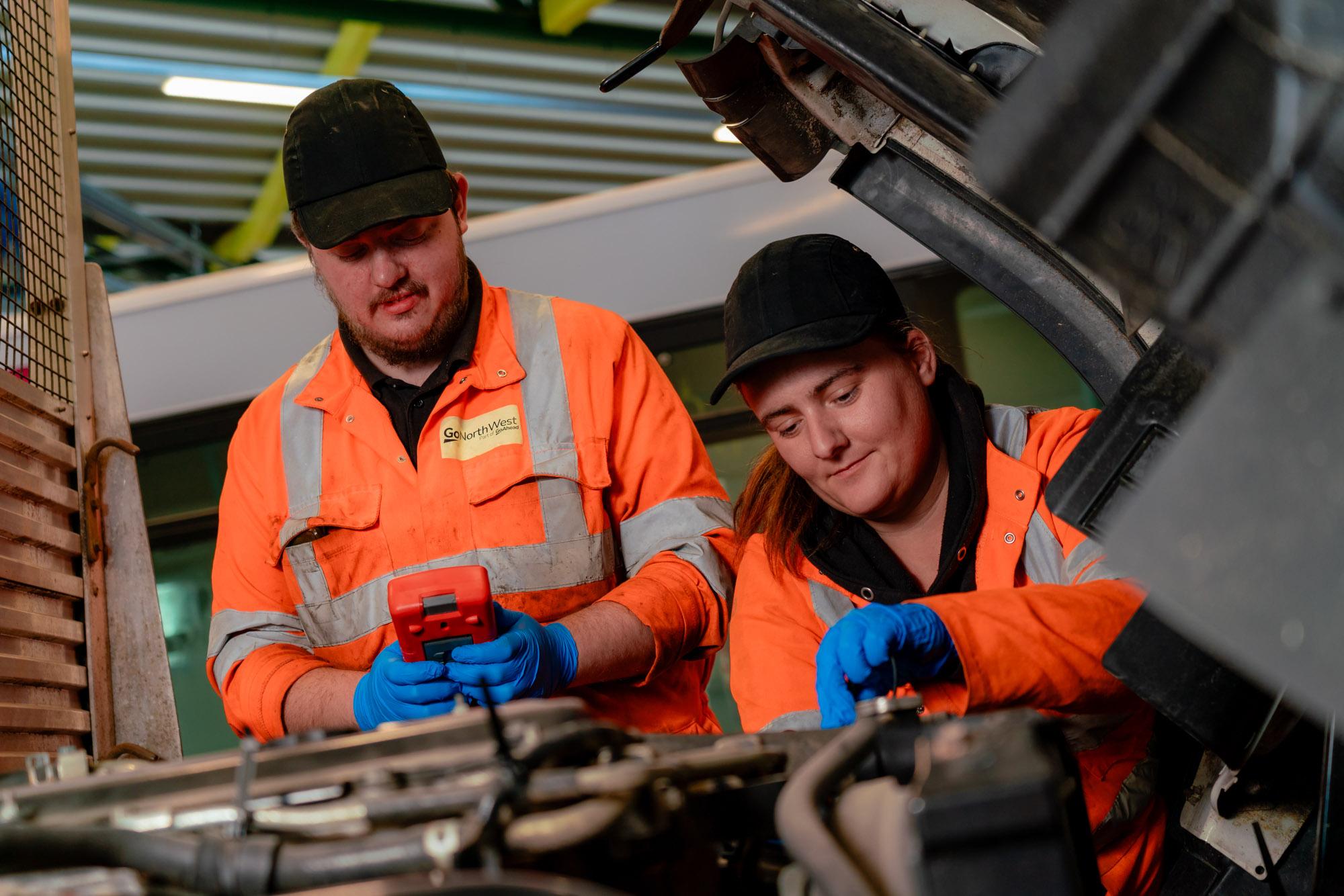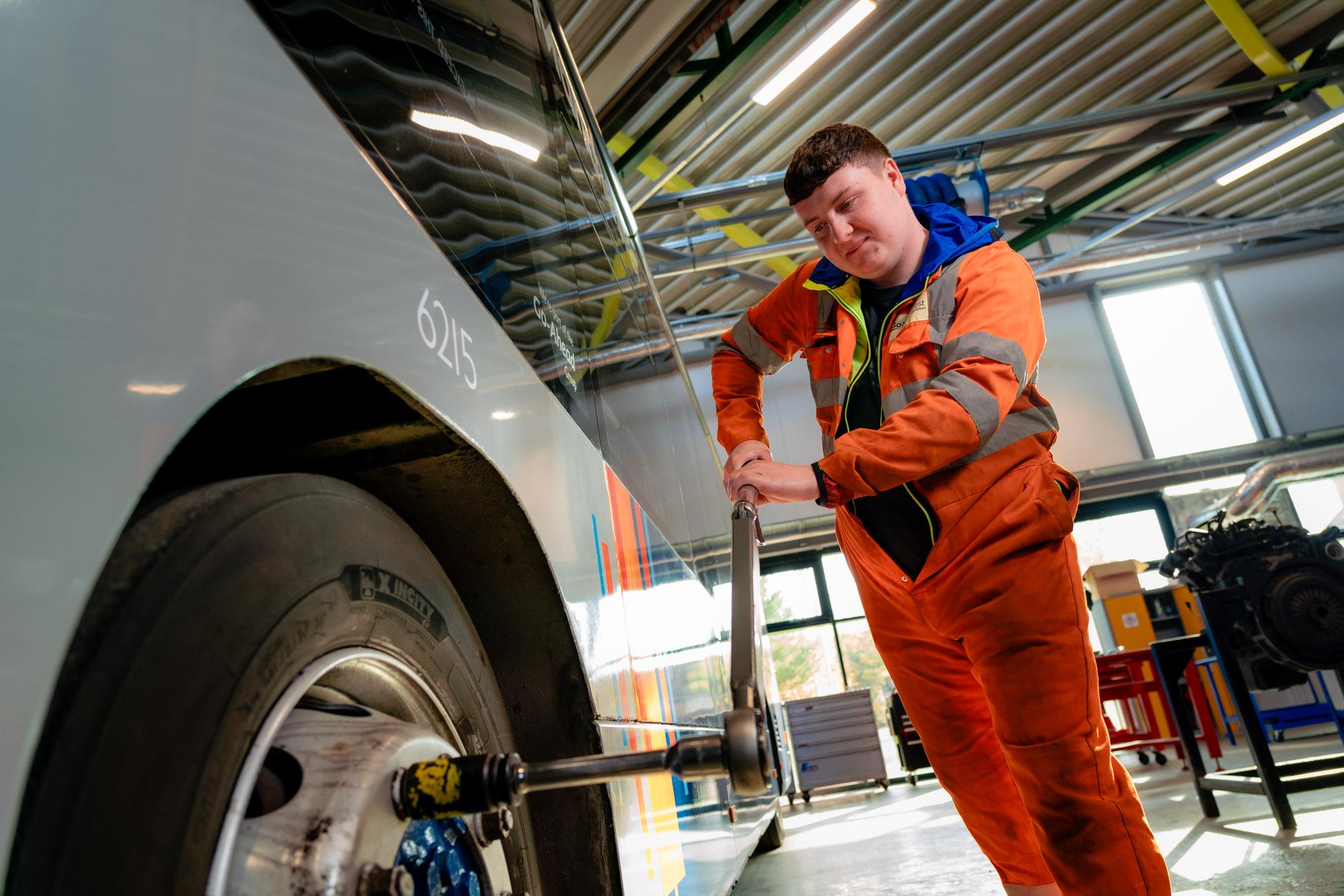Level 3 Heavy Vehicle Service and Maintenance Technician
Awarding body:

Duration: 36 months (plus 3 months EPA)
Heavy Vehicle Service and Maintenance Apprenticeship
If you're looking to build a career in the automotive industry, this apprenticeship is designed to give you the practical skills and knowledge you need to succeed. As a Heavy Vehicle Service and Maintenance Technician, you'll play a vital role in inspecting, servicing, and repairing heavy vehicles and trailers.
Throughout this programme, you'll receive expert training to develop your problem-solving skills and master both the theoretical and practical aspects of vehicle systems. From replacing simple parts to diagnosing and fixing complex faults using advanced diagnostic equipment, you'll gain the confidence and expertise to work in dealerships, independent garages, franchises, or large fleet operations.


Topics, units and assessments
- Health, Safety and Good Housekeeping in the Automotive environment
- Using hand tools and equipment in the Heavy Vehicle work environment
- Support for job roles within the Automotive environment
- Conduct routine Heavy Vehicle maintenance
- Remove and replace Heavy Vehicle Chassis units, engine system units, electrical system units and components
- Remove and replace Heavy Vehicle Transmission and Driveline system units and components
- Diagnose and rectify Heavy Vehicle Auxiliary Electrical system faults
- Inspect Heavy Vehicles to comply with legal requirements
- Diagnose and rectify Heavy Vehicle Engine system faults.
Before entering the gateway, you must have been successful in completing all knowledge, skills, behaviours and duties, linked to the standard. The following must also be completed:
- Level 2 Functional Skills English and maths or equivalent
- A portfolio of evidence to underpin the Professional Discussion
- Completion of the Case Study Scope and title document for approval.
How you’ll learn
This course will be delivered through a mix of face-to-face learning, remote reviews, online assessments and self-study.
Off the job practical skills training and one to one coaching is facilitated at our industry-standard expert training centre in Wythenshawe, South Manchester.

-
Engineering Manager
Engineering managers oversee maintenance teams, ensuring buses and coaches are safe, efficient, and meet regulations. They manage resources, schedules, and budgets to keep operations running smoothly.
-
Workshop Manager
Workshop managers supervise teams of technicians, coordinate schedules, and maintain tools and equipment. In bus and coach workshops, they play a key role in keeping fleets roadworthy and operational.
-
IRTEC Inspector
An IRTEC Inspector is a technician certified to carry out inspections and safety checks on commercial vehicles. Their role involves conducting detailed inspections, diagnosing issues, and ensuring vehicles comply with industry regulations.
-
MOT Inspector
An MOT Inspector is responsible for conducting annual MOT tests on vehicles to ensure they meet road safety and environmental standards. They check key components and identify any defects that need fixing to certify the vehicle as roadworthy.
-
Increased Operational Efficiency
Apprentices trained in preventative maintenance and fault diagnostics, help reduce unplanned downtime, ensuring that machinery and systems run efficiently. This leads to fewer costly repairs, improved production output, and streamlined operations critical in industries like oil, gas, power, and manufacturing.
-
Stronger Workforce & Succession Planning
With an aging workforce and skills shortages in the MOET industry, apprenticeships provide a structured way to develop skilled engineers who understand your business from the ground up. This secures a steady flow of qualified technicians, reducing reliance on external hires and ensuring long-term workforce stability.
-
Improved Compliance & Safety Standards
MOET apprenticeships embed safety-first mindsets from the start, ensuring employees are trained in industry-specific health and safety regulations (HSE), hazardous material handling, and risk assessments. A well-trained workforce means fewer accidents, better compliance with regulations, and a reduced risk of costly penalties or legal issues.
-
Cost Savings & ROI on Training Investment
Government funding and apprenticeship levy support reduce training costs, making apprenticeships a cost-effective solution for developing in-house talent. Over time, apprentices become highly skilled employees, reducing recruitment costs, increasing productivity, and delivering a strong return on investment for employers.

Employer Hub
Get the information you need on how apprenticeships can benefit your business.
Our Employer Hub provides clear guidance on how apprenticeships can help your business thrive, plus all the details about funding and support you'll get every step of the way to make apprenticeships a key part of your workforce strategy.
Employer solutionsI'd say I definitely learned more about motor vehicles, which has also taught me skills I can take away from this into other jobs.
Ben, Bus and Coach Apprentice
